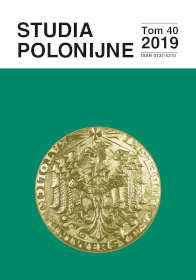Polish Diaspora and Military Intelligence of the Second Polish Republic, 1918-1939. An Outline of the Problem
Polish Diaspora and Military Intelligence of the Second Polish Republic, 1918-1939. An Outline of the Problem
Author(s): Wojciech SkóraSubject(s): Politics / Political Sciences, Politics, Social Sciences, Sociology, Security and defense, Migration Studies
Published by: Towarzystwo Naukowe KUL & Katolicki Uniwersytet Lubelski Jana Pawła II
Keywords: Polish diaspora; military intelligence; Second Polish Republic
Summary/Abstract: Millions of Poles living outside of their native lands, that is members of Polish diaspora, were recognized by the Polish authorities as a reservoir of strong support for the homeland. The Polish Ministry of Foreign Affairs conducted activities aimed at turning them into a useful tool in the hands of the government. Polish diaspora, mainly understood as Poles permanently living abroad, formed the basis for Polish intelligence activities in the interwar period. An analysis of selected intelligence networks and agents’ nationalities may lead to such a conclusion. This phenomenon applied not only to “small fries” in the intelligence cycle, that is thousands of people gathering meaningless information, but also to the most prominent agents, who – although less often – were of Polish origin.
Journal: Studia Polonijne
- Issue Year: 2019
- Issue No: 40
- Page Range: 209-221
- Page Count: 13
- Language: English

